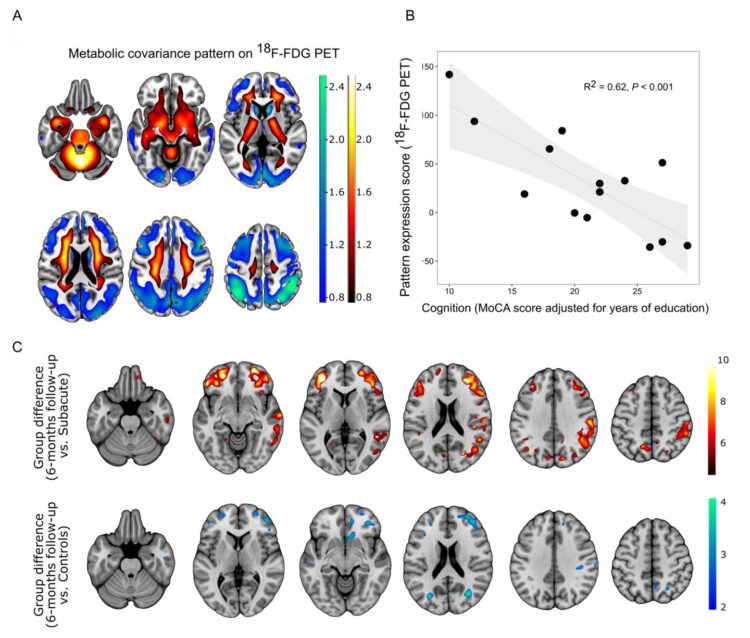Reston, VA–The effects of COVID-19 on the brain can be accurately measured with positron emission tomography (PET), according to research presented at the Society of Nuclear Medicine and Molecular Imaging (SNMMI) 2021 Annual Meeting. In the study, newly diagnosed COVID-19 patients, who required inpatient treatment and underwent PET brain scans, were found to have deficits in neuronal function and accompanying cognitive impairment, and in some, this impairment continued six months after their diagnosis. The detailed depiction of areas of cognitive impairment, neurological symptoms and comparison of impairment over a six-month time frame has been selected as SNMMI’s 2021 Image of the Year.
Each year, SNMMI chooses an image that best exemplifies the most promising advances in the field of nuclear medicine and molecular imaging. The state-of-the-art technologies captured in these images demonstrate the capacity to improve patient care by detecting disease, aiding diagnosis, improving clinical confidence, and providing a means of selecting appropriate treatments. This year, the SNMMI Henry N. Wagner, Jr., Image of the Year was chosen from more than 1,280 abstracts submitted to the meeting and voted on by reviewers and the society leadership.
“As the SARS-CoV-2 pandemic proceeds, it has become increasingly clear that neurocognitive long-term consequences occur not only in severe COVID-19 cases, but in mild and moderate cases as well. Neurocognitive deficits like impaired memory, disturbed concentration and cognitive problems may persist well beyond the acute phase of the disease,” said Ganna Blazhenets, PhD, a post-doctoral researcher in Medical Imaging at the University Medical Center Freiburg, in Freiburg, Germany.
To study cognitive impairment associated with COVID-19, researchers carried out a prospective study on recently diagnosed COVID-19 patients who required inpatient treatment for non-neurological complaints. A cognitive assessment was performed, followed by imaging with 18F-FDG PET if at least two new neurological symptoms were present. By comparing COVID-19 patients to controls, the Freiburg group established a COVID-19-related covariance pattern of brain metabolism with most prominent decreases in cortical regions. Across patients, the expression of this pattern showed a very high correlation with the patients’ cognitive performance.
Follow-up PET imaging was performed six months after the initial COVID-19 diagnosis. Imaging results showed a significant improvement in the neurocognitive deficits in most patients, accompanied by an almost complete normalization of the brain metabolism.
“We can clearly state that a significant recovery of regional neuronal function and cognition occurs for most COVID-19 patients based on the results of this study. However, it is important to recognize the evidence of longer-lasting deficits in neuronal function and accompanying cognitive deficits is still measurable in some patients six months after manifestation of disease,” noted Blazhenets. “As a result, post-COVID-19 patients with persistent cognitive complaints should be presented to a neurologist and possibly allocated to cognitive rehabilitation programs.”
“18F-FDG PET is an established biomarker of neuronal function and neuronal injury,” stated SNMMI’s Scientific Program Committee chair, Umar Mahmood, MD, PhD. “As shown the Image of the Year, it can be applied to unravel neuronal correlates of the cognitive decline in patients after COVID-19. Since 18F-FDG PET is widely available, it may therefore aid in the diagnostic work-up and follow-up in patients with persistent cognitive impairment after COVID-19.”
###
Abstract 41. “Altered regional cerebral function and its association with cognitive impairment in COVID 19: A prospective FDG PET study.” Ganna Blazhenets, Johannes Thurow, Lars Frings and Philipp Meyer, Department of Nuclear Medicine, Medical Center – University of Freiburg, Faculty of Medicine, University of Freiburg, Freiburg, Germany; Nils Schroeter, Tobias Bormann, Cornelius Weiller, Andrea Dressing and Jonas Hosp; Department of Neurology and Clinical Neuroscience, Medical Center – University of Freiburg, Faculty of Medicine, University of Freiburg, Freiburg, Germany; and Dirk Wagner, Department of Internal Medicine, Medical Center – University of Freiburg, Faculty of Medicine, University of Freiburg, Freiburg, Germany.
All 2021 SNMMI Annual Meeting abstracts can be found online at https:/
About the Society of Nuclear Medicine and Molecular Imaging
The Society of Nuclear Medicine and Molecular Imaging (SNMMI) is an international scientific and medical organization dedicated to advancing nuclear medicine and molecular imaging, vital elements of precision medicine that allow diagnosis and treatment to be tailored to individual patients in order to achieve the best possible outcomes.
SNMMI’s members set the standard for molecular imaging and nuclear medicine practice by creating guidelines, sharing information through journals and meetings and leading advocacy on key issues that affect molecular imaging and therapy research and practice. For more information, visit http://www.
Media Contact
Rebecca Maxey
[email protected]
Original Source
http://www.





